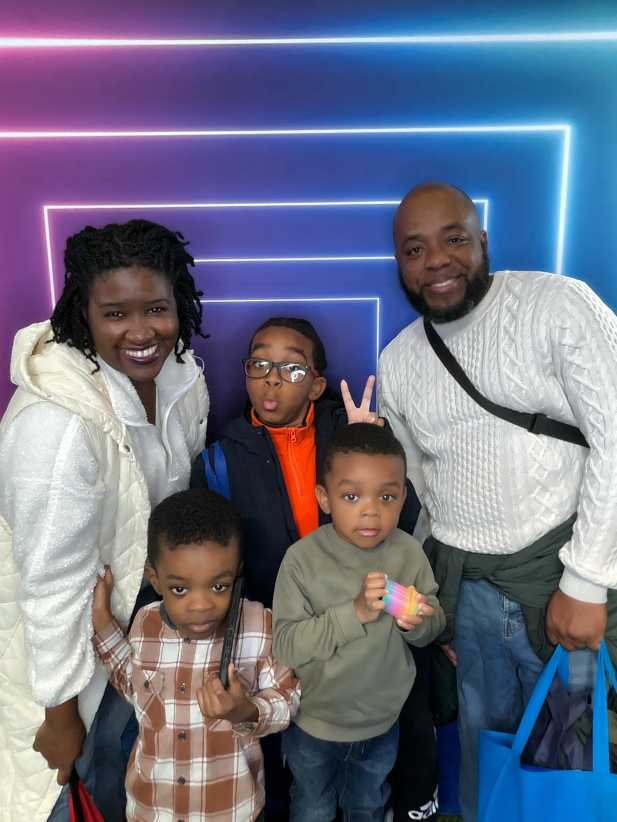 A journalist with long-time gigs as an editor at Harper’s and the New York Times magazine, NYC dad Paul Tough has spent much of his career thinking, reporting, and writing about education. In his first book, Whatever It Takes: Geoffrey Canada’s Quest to Change Harlem and America, Tough chronicles the challenges and triumphs of the famous Harlem Children’s Zone. His new book is called How Children Succeed: Grit, Curiosity, and the Hidden Power of Character. In part, it grew out of his reporting on kids from low-income neighborhoods. But it also became personal. “I had my son, Ellington, who is now three,” says Tough, “and I found myself wondering about this question as a parent as well: What do you do to help your child succeed?
A journalist with long-time gigs as an editor at Harper’s and the New York Times magazine, NYC dad Paul Tough has spent much of his career thinking, reporting, and writing about education. In his first book, Whatever It Takes: Geoffrey Canada’s Quest to Change Harlem and America, Tough chronicles the challenges and triumphs of the famous Harlem Children’s Zone. His new book is called How Children Succeed: Grit, Curiosity, and the Hidden Power of Character. In part, it grew out of his reporting on kids from low-income neighborhoods. But it also became personal. “I had my son, Ellington, who is now three,” says Tough, “and I found myself wondering about this question as a parent as well: What do you do to help your child succeed?
Your book makes the case that non-cognitive skills (which you call “character”), even more than academic achievement, are the key to long-term success. Can you define non-cognitive skills for our readers?
The phrase comes from economists and, in particular, a Nobel Prize-winning economist from the University of Chicago, James Heckman. He started using this phrase about ten years ago to explain what he was seeing in his data. He found that there were certain kids who scored low on IQ tests but would go on to succeed, or who would score high on IQ tests but not go on to succeed. As he looked deeper into the data, he identified these other skills that seemed to determine success. Some of the skills have to do with self-regulation, like conscientiousness and self-control. Some of them have to do with optimism, curiosity, zest—basically wanting to explore new things. And grit and perseverance are another set—they’re about intensity, sticking with something, bouncing back from failure. In lots of ways, I find “character” a more accurate or evocative term for these skills because it gets at how important they are. They are a really deep part of what it means to be human.
What do you think is the role of parents in ensuring children’s success?
At this particular moment we’re living in, there’s a lot of anxiety among parents about how to help our children succeed. I think New York parents care very deeply about this question, but I also think we hear a lot of conflicting messages, and so we feel confused—not just about how to help our kids succeed, but about what kind of success we really want for them. What I took away from the research I read is that parents are critically important to a child’s development, more important than anything else, but that the elements of parenting we’ve come to believe are most important are often at odds with reality. Especially in wealthier neighborhoods, I think we put way too much emphasis on cognition and intelligence and test scores.
There is this idea that IQ and academic skills are the best predictors of a child’s success—in fact, that they’re the only good predictors—and so there’s this intense pressure around tests at every stage of life, from preschool to LSATs, and [surrounding] admissions to the right schools. But what the research says is that, in fact, the most important thing we can do to help our kids develop the skills they need to succeed is to give them close, nurturing support in the first years of their lives. That makes a huge difference in how they do later on.
Now, where things get complicated is that as kids get older, they need something very different from us. They need less support. They need us to let them fail, to let them figure things out for themselves, to let them be more independent and solve their own problems. And what the research doesn’t tell us is exactly when and how we’re supposed to switch from one style of parenting to the other. That’s a real challenge for parents.
You place a lot of importance on the first few years and parent-child attachment. Should we now be worried about a kind of backlash against trends like early enrichment programs, where everyone shifts from an extreme focus on academic performance to an intense anxiety about connection?
I do worry about stoking parental anxiety, but I hope the book will encourage parents to relax rather than freak out. To me, what the research on attachment implies is that most children need a basic level of love and security and nurturance. Studies on attachment indicate that 60 percent of American one-year-olds display a secure attachment with their parent or parents. That’s a pretty big group. Attachment, the way I see it, is not a way to produce super-children; it’s about providing enough love and attention that your children wind up in the secure 60 percent. You can make a lot of mistakes as a parent (as we all do) and still get it right. And if you get it right, your child has a big advantage starting out.
You talk about adversity and how experiencing some adversity in childhood or early adulthood can make for a more well-adjusted and successful adult. If one is lucky enough (or perhaps unlucky enough) not to face much adversity in their childhood, are there ways that parents can challenge their son or daughter?
It’s important to note that the kinds of adversity many kids are experiencing in the South Bronx or in Harlem isn’t good in any way. It does real damage. But for affluent parents, it’s about a bigger shift in how you think about childhood. As we all know, kids in high achieving, high pressure schools are working incredibly hard. They are often burned out, stressed out. But at the same time, people like Dominic Randolph [the head of the Riverdale Country School] are right—these kids are not experiencing real failure; they’re not open to real adversity or taking real chances. They’re not even enrolling in classes they might be interested in if it might pull their GPA down. But you can make the case that those are just the kind of classes they should be taking. In some ways, the advice I would have for parents in that situation is to expand their definition of successful to include [the word] “challenge” much more than it is included now. The big message is to give kids the opportunity to take on more serious challenges, to go off in strange directions sometimes, and have the opportunity to fail.
And why write a chapter that’s all about chess? Whatever skills chess helps children to develop, could they learn those same skills from an art program, a musical instrument, or some sports?
I think so. Chess was there to show how far kids could go with this type of non-cognitive training. We think of chess as such a cognitive skill. But the most amazing thing to me going on at I.S. 318 [the Brooklyn middle school in a low-income neighborhood which won the 8th grade national chess championship] was that the chess teacher, Elizabeth Spiegel, was able to use non-cognitive techniques to increase her kids’ skill level. Those skills can absolutely come from something other than chess. Sports, when they’re done right, develop the same things. Kids learn that they can exceed what they think of as their limits—that they can keep pushing themselves. When you’re practicing piano you get that same kind of instant feedback that you do in a chess game. When you’re playing chess and you make a mistake, an opponent takes your pawn; when you’re playing piano and make a mistake, you sound terrible. That sort of feedback, if you have the right kind of teacher, can lead to much bigger success.
Going back to optimism, zest, and curiosity—how does one get at those? Can they be taught?
One thing that was really striking to me in the research was how much those skills were correlated with good parenting. When parents in the first few years were able to create strong attachment, a real sense of security in kids, those kids were more optimistic, more curious, and were happier and psychologically healthier as a result. Those skills are really built very early on.
And what if they’re not?
Schools can do a lot. [But] the way we run our schools is not focused on curiosity. When you’re focused on tests, you’re focused on a single right answer. Successful scientists, though, are ones who go beyond the right answer and look for alternative solutions. There are ways to teach that and it involves a more open approach to learning than traditional public schools typically offer. Optimism and happiness are definitely related. Some of these techniques that [the charter school group] KIPP is using—positive psychology and cognitive behavioral techniques—are designed to help kids with optimism and psychological wellbeing. I was really struck by the way these interventions helped kids re-orient themselves in adolescence. At that age, they can think about things in a much more self-reflective way: Why do I feel this way? Why do I do this? Why do I keep making the mistakes I’m making? I think schools can really help kids reframe things and think in a broader way. It’s a different kind of teaching, but there’s lots of evidence that it not only works but it’s really valuable in preparing kids for success.
If you were suddenly U.S. Secretary of Education Arne Duncan—with unlimited power—what changes would you make to our school systems?
A lot of what I would do is with kids at the low end of the income spectrum. There are places like the south side of Chicago where these kids are really not being served well at all by the system we’ve created for them. We are not giving them a system that allows them to succeed. I think the evidence is that if we want children in chaotic homes to do well in school, we need to provide supports for them that go beyond the classroom. The attachment-focused parenting interventions that I described at the end of chapter one are an important and effective way to do that, but they’re not the only way. The YAP program that I wrote about in Chicago is doing something similar: providing substitute family structures to support adolescents who don’t get that support at home.
This is a touchy subject, because Americans are rightly concerned about the government getting involved in the way our families operate. But the evidence is so clear about the negative effect of chaotic family environments on children’s outcomes. These kids are more likely than ever before to have a fractured family or live in a violent neighborhood. So I think we need to rethink the question of where the public responsibility for a child’s wellbeing begins and ends. Not surprisingly, [as the Secretary of Education] I’d also think more about character strengths and non-cognitive skills and how our system could value and measure those skills. I worry that focusing on test scores as a way to measure success for teachers and principals will just continue to emphasize skills that I think are not the most relevant for success and push out the kind of learning that, I think, we all understand is more valuable.
We keep hearing that American education isn’t up to par with learning in many other industrialized nations. As someone who has covered education for much of his career, how do you feel about state of education in this country?
I continue to feel concerned about the things I felt concerned about ten years ago. I’m very concerned about the achievement gap and the fact that it hasn’t changed at all, and, in some ways, it’s getting worse in terms of class and race. I’m worried that we’re not trying hard enough to find real solutions to that problem.
In terms of the education of the majority of kids in the United States, I tend to feel more optimistic. There are lots of schools I visit where kids seem to be getting a great education from Pre-K all the way up through high school. I do feel like this issue of high pressure in schools, the emphasis on tests and not enough on character, does make a difference. But part of the reason I feel less concerned about this in well-off communities is that parents in those communities are really good about responding to research. There is this groundswell taking place where parents are saying, “Aha! We did go a little too far in this direction.” And because they want their kids to be successful, they’re going to realize that we need a slightly different approach. On the whole, I feel pretty optimistic about the ways American kids are being educated. My concern continues to be kids at the bottom and how we still have not designed an education system that allows them to succeed.
After years of lots of love and attachment, New York City mom of three, Tali Rosenblatt-Cohen, now plans to make sure her children face a lot of adversity.
For more on school and admissions, look for New York Family’s Ultimate Guide To Local Education, 2012-2013 Edition, coming out in October—or find the digital version on www.newyorkfamily.com













